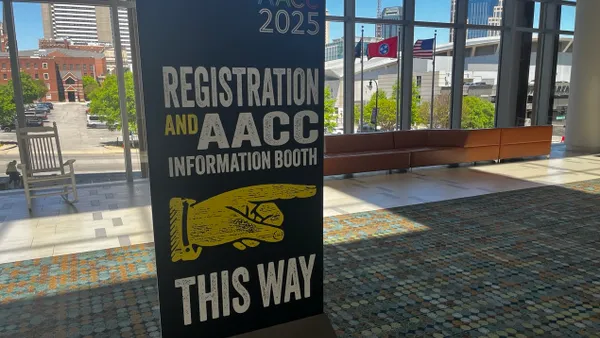Dive Brief:
- Applicants to test-optional colleges for admission in fall 2021 were more likely to withhold low SAT scores and disclose high ones, according to a study of College Board data by researchers at the organization and University of North Carolina at Chapel Hill.
- Students who enrolled after disclosing their scores had SAT results that met the median of their institution's previous classes. But those who withheld during the application process had scores averaging in the 19th percentile of previous cohorts.
- Applicants were more likely to send scores to test-optional institutions that indicated in statements that they were still important, implying that students take such statements at face value, according to the study, which has not been peer reviewed.
Dive Insight:
When colleges said they would not make negative inferences about students who withheld SAT scores, students appear to have believed them, the study suggested.
“During the admissions year we study, colleges were able to convince applicants that they would follow through on their policy statements,” Brian McManus, co-author of the study and professor of economics at UNC-Chapel Hill, said via email.
That’s a striking finding for economists, McManus said.
“Normally we think about individuals and institutions seeking whatever advantages they can to learn about others, including making inferences from selectively withheld information like test scores,” McManus said.
Students in the study were applying to colleges ahead of the fall 2021 term, when pandemic-induced school shutdowns and testing delays caused many institutions to adopt test-optional policies.
At that time, more than two-thirds of all four-year universities in the U.S. didn’t require test scores from at least some applicants, according to data from FairTest, a group advocating for the limited application of standardized assessments.
The lack of widely available testing options likely changed how students approached their applications. For example, students who took the SAT but lived in areas with substantial COVID-related shutdowns were more likely to withhold scores than students who lived in quick-to-reopen areas, the study said.
Applicants who withheld scores might have believed that colleges would assume they lacked testing opportunities, authors said.
That environment is changing, as more testing opportunities now exist for students, and institutions are choosing to either revise their test-optional policies or make them permanent.
But McManus said if applicants continue to believe colleges’ statements, then they will continue the pattern of withholding low scores.
“Some early evidence from the College Board on the entering class of 2022 suggests that applicants continued to withhold low scores,” he said.
Because students who withheld their scores on average had lower results, institutions were less informed about which students were in need of greater academic support. Score disclosers had a higher first-year GPA than their peers who withheld scores, and were less likely to receive a GPA under 3.0, the study found.
“We think of this result as evidence that students arrive on campus with a variety of academic backgrounds and strengths, and colleges may want to track which students need assistance for a successful launch into college,” McManus said.
But if institutions want applicants to truly consider them test-optional, they will need to commit to not taking such averages into account when making admissions decisions.
“If commitment is not possible, and institutions infer poor testing aptitude when scores are not present,” researchers wrote, “then the voluntary nature of test-optional policies may unravel, and all applicants will feel compelled to disclose scores.”













